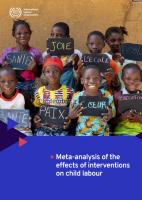This meta-analysis includes a comprehensive set of interventions to provide a quantitative assessment of their impact on child labour.
The research reviewed 614 studies on child labour and forced labour identified by the ILO's "Research to Action" (RTA) project and an additional 40 recent studies to obtain a sample of 41 randomized and quasi-experimental impact evaluations suitable for the meta-analysis. As several outcomes and interventions are reported in these studies, 131 effect-size estimates were collected; of these, 86 refer to the child’s probability of engaging in any type of activity, paid or unpaid, and 45 refer to hours of work.
The results suggest that cash transfers (both conditional and unconditional) seem to be quite successful in decreasing the probability of engaging in economic activities and working hours among children in developing countries. The summary effect size from other interventions is small and, in some cases, not statistically significant.
Different factors explain these results: for instance, conditional cash transfers increase the income of the household (income effect) and the opportunity cost of schooling (substitution effect) which affects the demand for child labour. Unconditional cash transfers are not attached to any specific behavioural condition to receive payment, and act as a pure income effect without changing parental time in the household or the demand for child labour in household enterprises.
Other types of intervention do not target children directly; thus, we expect the impact on children to be smaller depending on the household behaviour. Moreover, these types of intervention may be underpowered to detect an effect on child labour. At the same time, given the popularity of CCTs, there is more experimental evidence on the impacts of CCTs on child labour, which provides more robust impacts.
